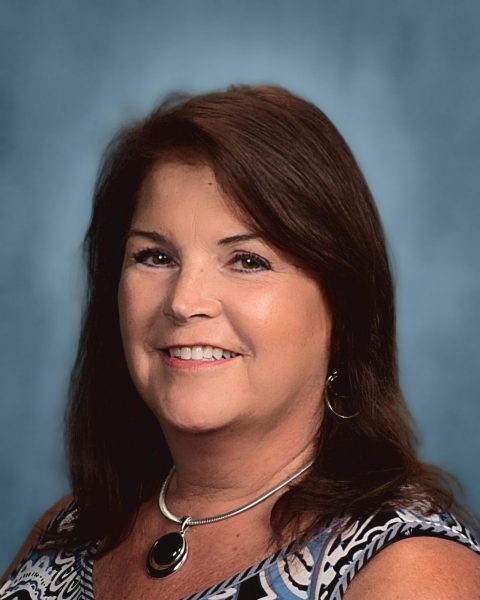Students choose the level of class that best fits them
Regular classes, honors, AP vary to some degree
IMAGE / Lauren Richardson
Junior Lexi Kelly works in the media center. Kelly challenges herself by taking honors and AP classes.
When we enter high school we’re all given a choice.
For junior Brandi Morgan, an all-A student in the regular classes offered at Kearsley, she chose not to take honors classes.
Morgan said that even with her busy schedule, she has the ability to take higher-level courses but has stayed with the regular classes.
“Sometimes I think I should have taken honors classes because I know I could handle them, but I didn’t because of the extra homework teachers give and sports,” Morgan said. “Regular classes do sometimes still challenge me, though, like chemistry and political science.”
Choosing which courses to take is important. Whether the courses are Advanced Placement, honors, or the regular classes, students all choose where they think they fit best.
But some students do not think these three types of classes differ.
Junior Lexi Kelly has taken all three types of courses, experiencing similarities between a regular class and an honors course.
Honors courses are meant to be more of a challenge than a regular class, offering more and harder work for the more driven students. But Kelly said some honors courses seem to be just filled with more work instead of more challenging work.
“Honors is definitely the same work as a regular class, just more assignments instead of more challenging work, except for the tests,” Kelly said. “Regular classes have been given the opportunity to take easier tests in groups, while we take a different version individually.”
Mr. Andy Nester, political science and AP government teacher, believes it is not the idea of more work that should divide students. It should be more in-depth material that separates them.
“I’m not a big fan of quantity,” Nester said, “so more work is never really an answer to me, and points that inflate a grade mean nothing about a student’s real ability.”
For some, it is hard to differentiate between the demands of a regular class and honors.
But Nester said it has not always been this way. He said honors classes used to have a more demanding curriculum.
Due to this change, the honors program is in the works of being removed within the next year for the social studies curriculum, only allowing students to take the regular courses or an AP course.
The plan is to give juniors the opportunity to take a full year of AP government instead of a half year of honors political science, as well with economics.
Nester said, “It has come apparent to us, mostly because of funding and the way the KATS program at the middle school operates and the way most classes here operate now, that an honors class just isn’t needed anymore.”
The change will not take place until the 2017-2018 school year because the school is awaiting approval from the Kearsley Curriculum Council and the Board of Education.
Honors vs. AP
The curriculum for an honors class is based off state standards, but teachers put their own twists on the classes, making them what they believe to be honors.
Students have to be selected to be in an honors class, but it is offered in all grades at the high school.
The most different classes offered at Kearsley have proven to be the AP courses.
AP is a college-level class.
The curriculum is determined by College Board, which is a private nonprofit corporation whose mission is to give students greater access to higher education.
These classes have proven to be a different challenge for even the top students at Kearsley because of the rigorous atmosphere it creates.
Kelly is learning to adapt to her AP class.
“The only challenging class I have is AP (English) Language,” Kelly said. “But honors chemistry and honors economics are no different than a regular class to me.”
The AP courses offer college credit to students who pass the AP test at the end of the year with a 3 or higher out of 5. These courses also offer a GPA boost, meaning, if students get a B in these classes, it is actually similar to getting a B+.
A lower grade in a higher-level class is believed to be better than a higher grade in a lower-level class.
Kelly said, “I would rather get a lower grade in an AP class than a higher grade in an average class because I take pride in my work and would rather challenge myself and learn something new.”
AP has always been offered to juniors and seniors at the high school, in the classes of English language/composition, literature/composition, government, and calculus.
But it is now also offered to sophomores for world history. It will also be offered in micro economics this year during the second semester, although these students have to be accepted after proving they can handle the class.
Teachers typically take a different approach when teaching an AP class compared to honors or regular classes.
“The goal of an AP class is to be a college-level experience, and for me it’s impossible to do it in a five-day, 50-minute week schedule, so that’s difficult,” Nester said.
Nester uses a different approach when teaching each of his different classes.
“It would be within the level of sophistication of the reading and the way in which you comprehend it that makes it considered AP,” Nester said. “I teach a regular class by the content, but I teach an AP class by challenging kids to read and then to be able to know what they read.”
College Readiness
High school can be used to prepare its students for college.
Nester said Kearsley is heading in the right direction for getting its students college ready.
“I think we’re on the right track preparing students for college,” Nester said. “But the College Board recommends 16 students for an AP class, so when we have around 30 students, it’s just not the right formula.”
Mr. Garrett Jenkins, a former Kearsley student who graduated in 2014, took all of the AP classes offered at the high school. He now attends Michigan State University as a sophomore and still does not feel as prepared as he believes he should be.
“Kearsley doesn’t prepare you in general,” Jenkins said. “But I think AP classes will help a lot more than regular or even honors classes, and they look a lot better when applying for colleges.”
Nester said any student could take any of these three types of courses because of the similarities they all possess. It all depends on their determination to excel.
“I believe all students could be in an AP course, but they have to have that internal drive or motivation to improve reading skills and deal with data and accept the challenge that this is nothing like a regular or honors course,” Nester said. “It’s nothing they’ve ever done before.”

Class: Junior
Extracurricular Activities: Dance
Hobbies/Interests: Shopping, music, dancing, sleeping
Plans after high school: Attending Michigan...










